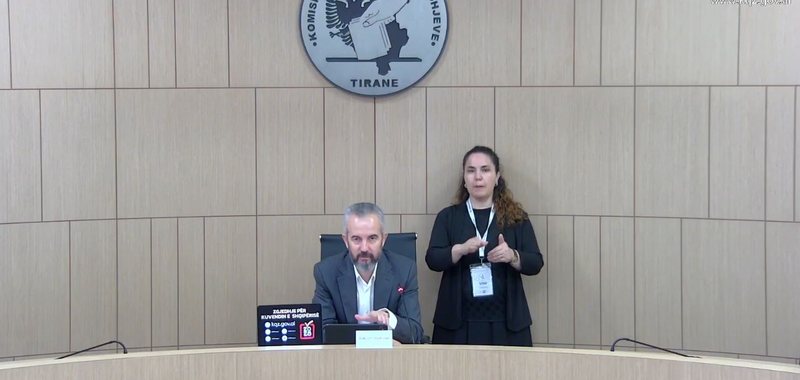The financial aspects of the election campaign!

The financial aspects of the election campaign are regulated by the Electoral Code and the Law on Political Parties. The latter also regulates general aspects of the financing of political parties. The main sources of campaign financing for electoral entities are:
- funds provided in advance from the State Budget to political parties registered as electoral subjects: there are three types of public funds for political parties based on election results:
for annual activities: each year, a special fund is defined in the State Budget that serves as public financial assistance to political parties, which is distributed in accordance with the provisions of Article 19 of the Law on Political Parties.
for election-related activities: political parties that have received no less than 1 percent of the votes nationwide in the most recent preceding elections of the same type, benefit from funds from the State Budget, based on the number of votes each party received in those elections.
Post-election financial compensation: a recalculation of funds is made after the elections by the CEC according to a formula based on the mandates won by political parties. Also, electoral entities that do not qualify for public funds before the elections (having received less than 1 percent of the votes in the last elections of the same type) may receive compensation after the elections, if they receive no less than 1 percent of the valid votes nationwide. Independent candidates are not entitled to public funds, contrary to good international practice.
- the electoral subject's own income generated according to law; (such as financial membership fees)
- non-public donations to the electoral subject and its candidates, in monetary value, in kind or services provided.
Donations may be made to: a) the electoral subject; and b) its candidates (including independent candidates) only by domestic natural or legal persons, including Albanian citizens residing outside the territory of the country. Donations given to candidates are considered contributions to the political party for which they are running, unless they are independent candidates. The amount that any natural or legal person may give to an electoral subject, including its candidates, may not exceed 1 million lek or equivalent value in kind or services.
Donations of non-public funds over 50 thousand lekë must be made only to a special bank account opened by the electoral entity. Electoral entities declare the bank accounts used for donations when registering with the CEC (according to the requirements for registration as electoral entities in accordance with Article 67 of the Code) and may not use any other bank account, other than those declared, for receiving donations for the electoral campaign, even for amounts less than 50 thousand lekë. The declaration form also includes the authorization for the CEC and its representatives to receive directly from the bank data on all account transactions. Each electoral subject must record in a special register, approved as a model by decision of the CEC, the amount of funds received for each natural or legal person, as well as other data related to the clear identification of the donor, lender or creditor.
Donations under 50 thousand lekë can also be made directly to the candidates in the bank account they normally use. However, if they plan to accept donations for their campaign with a value greater than 50 thousand lekë, they are obliged to open special bank accounts to accept donations of non-public funds. In this case, the individual's accounts must also be declared, when the candidate's electoral subject is registered as such 70 days before election day, according to Article 67 of this law.
The same obligations as above also apply to independent candidates proposed by voters.
- loans or credits received by political parties or their candidates, including independent candidates: These are other sources of financing the electoral campaign and the relevant legislation on borrowing and lending applies. In no case should the value of a loan or credit exceed the amount of 1 million lek or the equivalent value in kind or services.
Prohibitions related to election financing
According to the Electoral Code, resources of public bodies or entities at central or local level, or any other type of entity where the state owns capital or quotas and/or appoints the majority of the supervisory body or administrative body of the entity, regardless of the source of capital or ownership, may not be used or placed in support of candidates, political parties or coalitions in elections. Article 91 of the Electoral Code provides detailed provisions on restrictions regarding the prohibition of the use of public resources in support of electoral entities.
It is also prohibited to provide funds by a legal entity (or any of its shareholders) that:
has received public funds, public contracts or concessions in the last 3 years worth over 10 million lek. This prohibition also applies to subcontracting or public-private partnership contracts;
carries out activities in the field of media;
has been a partner with public funds in various projects;
has monetary obligations to the State Budget or to any public institution. This obligation does not apply if the shareholder owns these shares as a result of a public offering.
Natural persons or legal entities that have made donations to an electoral entity or its candidates in the elections may not benefit from public contracts, public-private partnership contracts or in any other way funds with a total value exceeding 10 million lek, including as subcontractors of a public contract/concession, for a period of up to 3 years after the date of the elections. Donors are required to sign a declaration stating that they are not in any of the circumstances provided for above and that they bear personal responsibility for false declarations.
Expenditures, reporting and monitoring of financial activities of electoral entities and candidates
Regardless of the amount of donations received, the amount of expenses incurred by an electoral entity, including its candidates, for an electoral campaign must not be more than 3 times the highest amount that an electoral entity has received from public funds for electoral purposes. The total expenditure that a candidate proposed by voters may incur must not exceed 50 percent of the highest amount that an electoral entity has received from public funds.
Election campaign expenses must be documented in accordance with fiscal legislation. Political parties are required to adopt internal regulations for the management of funds received by their candidates. Electoral entities are also responsible for coordinating the financial information and activities of candidates during the campaign, and are required to adopt internal rules and sanctions for the reporting of income and expenses by the candidate to the electoral entity, so that no donor, lender or creditor exceeds the limit of 1 million lek or the equivalent value in kind or services.
Electoral entities, including independent candidates, are required to submit a financial report for the election campaign to the CEC within 60 days of the announcement of the election results, according to the templates approved by the CEC. The report must include detailed information on all resources received and used for the election, including a register of donors, lenders and creditors. Article 92/3 of the Electoral Code provides detailed instructions on information on the financial resources and archives of electoral entities. After the 2023 local elections, the CEC created an Online Financial Reporting System, facilitating reporting, disclosure, access to financial information and improving the transparency of campaign financing.
The CEC oversees compliance with campaign finance regulations by monitoring campaigns to collect information. The CEC then appoints auditors to review these financial reports and publishes audit reports for electoral entities no later than 30 days from the date of submission of the report. The Electoral Code provides for a wide range of sanctions for campaign finance violations, including fines from 50,000 to 5,000,000 lekë, confiscation of public funds, and suspension of public financing for up to five years.

Celibashi: So far 185,679 envelopes from the diaspora, expected to reach 200 thousand
The Chairman of the Central Election Commission, Ilirjan Celibashi, has revealed some data regarding the diaspora voting process. He announced in a statement......

Voting/Turnout as of 10 a.m., 13.54% - Lower than in the 2021 parliamentary elections
13.54% of eligible voters have gone to the polls by 10:00 am on Sunday. Official data from the Central Election Commission shows that 1983 Voting Centers......

Celibashi reacts to the voting process so far!
Ilirjan Celibashi: "At this moment, no voting center is unopened or blocked. 8% of the VCs opened late, between 7:00 - 8:00. In 5%, not all members were......

Doshi after the vote: PSD's result will be a surprise, I will not form a coalition with Berisha
A few minutes ago, the leader of the Social Democratic Party, Tom Doshi, exercised his right to vote. The Social Democratic leader stated that this is a very......

Election turnout, from 98% to 46%/ Analysis: What is expected to happen in 2025 and what are the factors that will influence it?
Albanians have shown a steady decline in interest in voting in parliamentary elections over the past three decades. From the extraordinary enthusiasm of the......

Prime Minister Edi Rama votes!
Socialist Party Chairman and Prime Minister Edi Rama, accompanied by his wife Linda Rama, voted at the "Ymer Lala" school in Surrel. ...

Berisha calls on citizens: Vote for the future of your children in this country!
Democratic Party leader Sali Berisha voted at the "Kosova" school in Tirana. First, a heartfelt appeal to every Albanian citizen, today to vote, vote, vote......

Fier/Mayor Armando Subashi votes. Calls for mass participation and a peaceful process!
The Mayor of Fier, Armando Subashi, voted today together with his wife, also calling for mass participation and a peaceful process. "Today is a marked day......


















